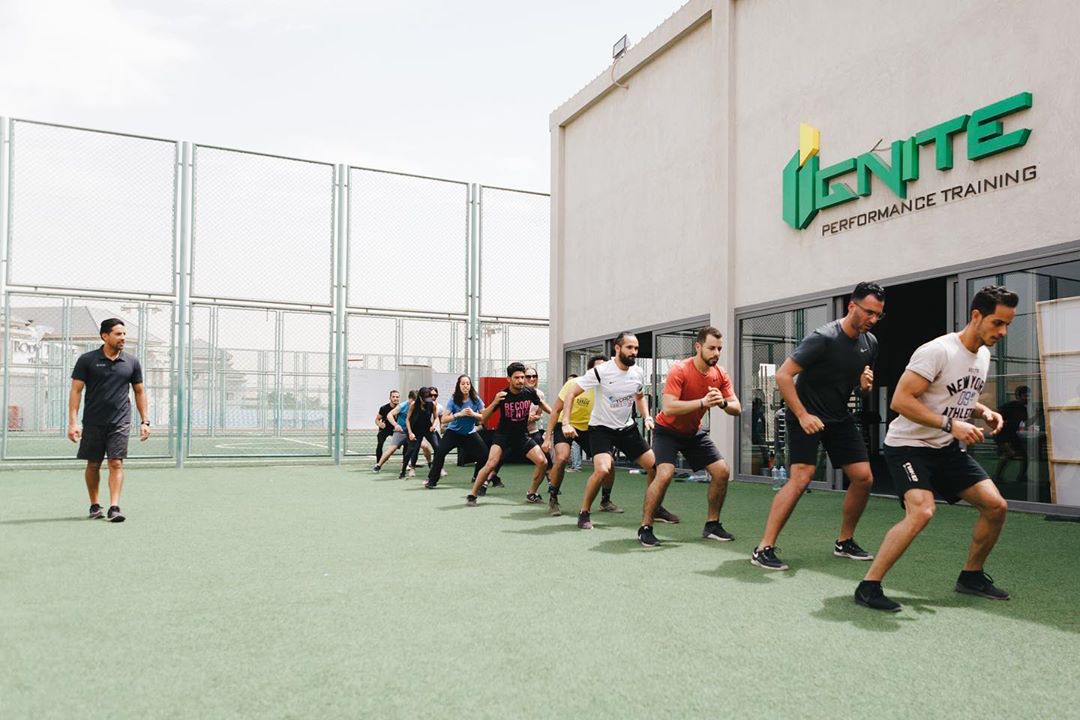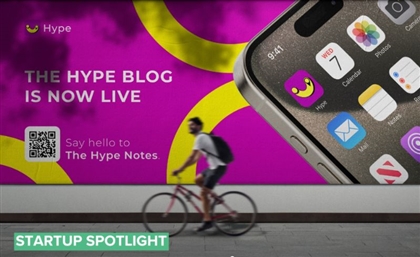PIVOTING IN A PANDEMIC: Egypt’s Fitness Entrepreneurs Built an Industry From Scratch. Now What?
We speak to the biggest Egyptian fitness entrepreneurs to find out how the young industry was so quick to shift online, and what the current crisis could mean for its future.

It’s hard to believe that only a few short years ago, Egypt’s fitness scene was so unrecognisable, that most of us were still working out in – *shudder* – traditional gyms and antiquated sports clubs. At first, it was a light smattering of trainers who’d hopped onto global fitness trends and modalities, before a few entrepreneurs transformed the run-of-the-mill sports scene – which had until then focused mainly on competitive sports teams, gyms, and the odd fitness class – into the booming ecosystem of big, bootcamp-style group classes, performance training, community-driven transformation challenges, and, yes, the occasional traditional gym, that we know today.
But what’s interesting about this industry isn’t the sculpted bodies and #FitnessInspo on Instagram, or even the culture of health and genuine wellbeing they’ve helped propagate. The most unique part of this booming industry is the entrepreneurs who transformed it: almost entirely young, with athletic but rarely business backgrounds, some managing to build veritable empires in an industry many didn’t take seriously at first.
But now they – along with every industry, in every country, in the whole wide world – have been hit with a curve ball impossible to predict or deflect. The Coronavirus, to put it lightly, has thrown a wrench in the cogs of every entrepreneur alive.

Here’s the thing though: On March 14th, the Egyptian government ordered the closure of all gyms and sports centers to help curb the spread of the virus. On March 15th – 24 hours after the decision that should, by all means, have left many a founder elbow-deep in a tub of ice cream, panic-ridden or in a dazed stupor – the entire industry had completely pivoted online.
Giving the workouts is therapy for me, and at a time like this, I knew we all needed it.
In the time that it took most people to really comprehend what was happening over their first coffee in their new work-from-home lives, social media had already been flooded with professionally-filmed home workout videos, links to online sessions, and options for personal training, essentially continuing everyone’s fitness journeys without missing a beat.

“It usually takes months to get something online up and running,” says Hussein Abdeldayem, founder and Technical Director of Ignite Egypt, the fitness empire that’s trained over 200 professional athletes and boasts a kaleidoscope of programmes for the average non-Olympian mortal. “To develop an app or an online platform – what we developed in 2 days – should take months. But as soon as we took the decision, we called up the developers and said ‘we have 48 hours to come up with a solution, and it’s not negotiable.’”
How and why was this young industry so quick to perform this pivot? And what does this crisis – amorphous and terrifying as it is, with no clear end in sight – mean for the entrepreneurs that built it? We spoke to five of the biggest names in the fitness game about their thoughts, fears, challenges and predictions.
I used to teach from a makeshift studio in this very room in my house... So I think it’s about really remembering what it means to use just the essentials.
Through the Looking Glass - Or Zoom Call - to Online Workouts
Everyone we spoke to – across business models and workout styles, pole classes to performance training, fitness empires to boutique studios – repeated the same thing: that offering something online, more than keeping your name out there, is a way to support the community. The outpouring of open workout videos and live sessions on Facebook and Instagram offers millions an accessible, safe, healthy way to keep fit, keep their wits about them, and hold off inevitable cabin fever.

MOVE Egypt – the fitness entity and gym management firm founded by former track and field athlete Ali Ismail – gave out sanitised gym equipment to active members to keep them engaged with their free home workouts, as well as their recently launched Zoom sessions. Ignite’s Abdeldayem similarly explains that, even with their online training platform, they will always ensure that something is available free of charge.
At this point, it’s all about how far we can go supporting our people.
“Selfishly, I started doing it for me. Giving the workouts is therapy for me, and at a time like this, I knew we all needed it,” explains Amina Naguib, founder of B-urn – one of Egypt’s few boutique fitness studios – who, throughout the past five years, has built a cult following with intense, heavily curated workouts focused mainly on the mental and emotional element of fitness.

Amina Naguib, founder of B-urn. Shoot by MO4 Network.
But the business dent is undoubtedly gigantic. According to Ismail, March through June is high season for the fitness industry, when a lot of people start working out, in preparation for summer or wedding season. Even if they can increase the number of paid programs to their closed-community, they’re still going to suffer a massive cut to revenue streams.
Is it sustainable? “No,” says Ismail. “We can hold on for a few months, maximum, and that’s any business. Especially with a model that has so many coaches, it’s impossible to keep this going for, say, a year.”
To make an investment – the amount of which could open a facility – in an online program, it’s a risk.
Survive by Going Back to Basics
Okay, so pull yourself up by your sneakers and break out the excel sheets. How do you prioritise? According to Mint Elmokadem, CEO and founder of the country’s first pole and aerial school, PoleFit Egypt, you hunker down and make an itemised list.

Mint Elmokadem, founder and CEO of PoleFit Egypt.
Her first priority was keeping things going, building an online schedule and system within 24 hours, and avoiding having to give refunds from her now-limited liquidity. Then – a decision many a CEO has taken – Elmokadem had to try and stop the company haemorrhaging money through tough decisions, some of which included staffing decisions. “But they would much rather suffer cuts now, than have nowhere to come back to later,” she says of staff reactions.
For Elmokadem, survival will hinge on the ability to put one’s pride aside, and go back to basics. “I used to teach from a makeshift studio in this very room in my house,” she says. “I didn’t have the money for speakers, so I was using this same laptop that I’m talking to you from. So I think it’s about really remembering what it means to use just the essentials.”
Whatever you do now will completely change your business.
Online Isn’t as Simple as it Looks
An interesting divergence was quick to emerge in this world we call Life in the Time of Corona, between traditional businesses such as restaurants and event venues, perhaps irreparably hit, and the digital industries of the future, such as streaming, gaming and SAAS.
The Egyptian fitness industry isn’t fully digitally enabled, so it can’t be said to be exactly thriving in the pandemic world, but it also possesses more agility than traditional businesses, with most entities having at least some social media following they can now capitalise on. “So far, it falls in between on-ground and online, but really developing something online like we did usually takes months, and a lot of money,” explains Abdeldayem. “So for someone to make an investment – the size of which could open a facility – in an online programme, it’s a risk. What happens after business returns to normal? Does it fit the business model to be online like this? What happens if right after you invest in this, everything goes back to normal sooner than you thought? I don’t think it’s easy, or feasible, for many people to take their platforms online beyond Instagram and Facebook, until it’s clearer where things are going.”
How do I negotiate with my landlord without getting kicked out? I don’t think people are talking about it enough.
Is it Still Gauche to Talk About Money?
Simply speaking, we don’t know if this will last for a minute or if it will stretch, quarter after quarter, derailing growth plans for who knows how long. “Ultimately, as humanity, we have no reference for what happens past this point,” reflects Deana Shaaban, Ignite’s Fitness Director. “If you were doing well on-ground before, that will give you a bit of an edge, but whatever you do now will completely change your business.”

Deana Shaaban, Technical Director of Ignite Egypt. Shoot by MO4 Network.
Anxiety abounds, and it’s easy to see why. There’s a reason we constantly talk about the entrepreneurial ecosystem; we exist in symbiotic relationships and – forgive us the cliché – nobody can do this on their own. So if, as a business owner, I say I’m broke, will everyone else clutch their pearls at me?
“There’s an entrepreneur group on WhatsApp, and there’s a bunch of tech people. This was happening, and I go on and say, ‘I don’t understand what you’re saying, but who here has rent, who’s broke, and what are you doing about it’,” Elmokadem laughs. “And people were like, ‘yes, I’m broke too, let’s talk. What are we going to do? How do I negotiate with my landlord without getting kicked out? But yeah, honestly speaking, I don’t think people are talking about it enough. I went public with it recently, how difficult it is to make ends meet right now. And I saw such an outpouring of support and people sharing our stuff. And I sat down and looked at one of my classes, which was suddenly super overbooked, and I just started crying in my car.”
You look around and you realise that the only way to survive is to come together.
It’s a Terrifying Time to Be a Leader
Again, everyone we spoke to had a common fear, echoed across this and every industry: how do you take care of your team during a time like this?
“It’s very easy to own assets or buy equipment, and overnight, a branch can close,” explains Ismail, adding that he’s not worried about the brand per se, which can sustain itself precisely because of how closely it’s connected with the personal brand of its founder. “But at the end of the day, it’s only your coaches that matter. And each has their own life and responsibilities. So losing them is my main fear.”
Abdeldayem, along with several of Ignite’s managers and heads, are either going without salaries or taking drastic pay cuts, in order to “support the rest of the company, whether you’re putting in an hour or 40 hours a week.” But still, tough salary cuts had to be made across the board.

“Our biggest worry at the moment is not being able to support our people,” continues Abdeldayem, “not how much money we’re making and losing or where the business is going. At this point, it’s all about how far we can go supporting our people.”
Elmokadem also expresses a longer-term fear. “I know what’s a necessity and what’s a luxury, right? And everyone is bleeding at the moment; no one is going to be able to live the same after this. My biggest fear is that after Corona, the number of people who are able to afford our classes – both in terms of money and time – is going to shrink massively.”
The Future of the Industry
Elmokadem’s experience with PoleFit’s classes also illuminates an opportunity that had, up to this point, remained underutilised in the Egyptian fitness industry: online classes. Her own class on Wednesday April 1st had students from eight countries across the Middle East and Europe, including Egyptians who had moved abroad or students she had taught in their home countries.
“It means that by the time we’re out of this, and we’ll have hopefully created all these digital programmes, we’ll have that client base of who to target internationally,” she explains. “And then also, because not all studios around the world have offered online classes, they’re sharing ours with their friends and their studios, and more people are joining our classes.”
There remains a difficult question. After the boom the industry has experienced over the past few years, are we likely to see it shrink? Will we, after all is said and done, have to see doors close?
The answer, across the board, was a reticent ‘probably,’ with Elmokadem positing one critical variable: “I think—or I hope—that we’ll really need to come together to survive. When you hit rock bottom, you look around and you realise that the only way to survive is to come together with somebody else. So that will be interesting to see. Are you going to be so proud, that you would rather sink by yourself or will you come together with somebody else and survive on the surface?”
Trending This Month
-
Jan 19, 2026






















